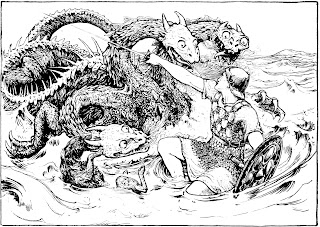Preface
Dungeons & Dragons 5e is a game that is fundamentally about combat. The outright majority of the game's mechanics and systems are geared that way. Of the ~25 pieces of information in a typical 5e monster stat block, 70 percent are combat stats and 20 percent are combat-related.
D&D 5e also offers tools for balancing combats by character level, purportedly with a fine degree of accuracy, and the Game Master's use of these tools is intrinsic to the core gameplay.
As a central, fine-tuned, high-stakes part of the game, combat therefore needs to work well and be satisfying.
Solo monsters
Some of the most archetypal tabletop gaming experiences pit a small group of player characters against one powerful, dangerous, usually large, monster.
But consider the boss and/or solo monster (and to a degree, monsters that appear in pairs or with a group of weak minions). In at least the last twenty years of D&D editions, boss monsters have suffered from a pair of related issues.
- First, they are often outplayed in the 'action economy'.
- Second, they are particularly vulnerable to 'save-or-suck' abilities, such that only one success is needed to trivialise the combat encounter.
5e does fairly well on the action economy stakes – at least, for legendary monsters which can enhance their multiattack or once-per-turn spell with lair actions and legendary actions. A GM who uses a non-legendary high-CR creature as a boss monster may find it falls behind in its ability to act (unless they pick something like the marilith or hydra, which have large numbers of attacks and extra reactions).
But 5e's approach to proofing bosses against save-or-suck is a blunt instrument.
Legendary resistance
D&D 5e is stuffed with status effects and such – banishment, restraint, incapacitation, sleep, save-or-die, paralysis, blindness, mind control, etc – which can be useful when levelled against a group of adversaries, but which risk trivialising a boss fight if pulled off.
The 5e designers were aware of this:
- Some ongoing status effects offer a saving throw repeated each turn to escape. (But there is little overall consistency on this.)
- Boss monsters tend to get improved saving throws.
- Boss monsters also fairly often have advantage on saves via Magic resistance.
So the designers also came up with the blunt instrument of 'Legendary resistance', to discourage players even trying save-or-suck spells in a boss fight. Three times a day, when a boss monster fails its save, it can choose to succeed instead.
And this basically works. It creates incentives to use alternative abilities (straight damage, buffing or summoning allies, no-save spells like Forcecage, Heat Metal, and Maze, etc).
Players can still try to double down on incapacitation if they really want to, but have to use attrition to penetrate the boss's saves and its uses of Legendary resistance. It becomes a hit points analogue, with high randomness and low granularity.
The problem is that just no-selling a player character ability isn't very fun at the table, and doesn't align well with other aspects of 5e's design.
It can also have unintended consequences. Player characters are incentivised in the meta-game to 'use up' the boss monster's Legendary resistance with their weakest, longest-range, and cheapest or most easily replenished abilities, while trying to disguise which ability they are using, to foil their adversary's ability to choose whether to no-sell something. This 'optimal tactic' can really throw you out of the game if you were expecting to be simulating a thrilling high-stakes encounter against a powerful monster.
Simple alternatives
Here are some ways you can change Legendary resistance to make it more fun and subtle, in order of least noticeable to most substantial change.
1. Make it have a cost. When Legendary resistance kicks in, the monster loses hit points, or a spell slot, or has disadvantage on saving throws until its next turn. This makes it more of an emergency measure but isn't always easy to justify in-universe.
2. Make it use up the creature's reaction. This at least means that the monster must be more selective about its use of Legendary resistance. If it has access to a special reaction like Parry or casting Shield, it also needs to balance against the possibility that it will want to use its reaction for that this round.
3. Make it a legendary action. One which can't be used on the same turn the saving throw was failed. The PCs get to capitalise on the status effect for at least one turn, and get to witness the monster actually do something to end the effect (e.g., giving a monstrous howl, straining its muscles, spitting up blood, clawing at itself). There's also the opportunity cost of legendary action selection.
4. Make it a bonus action. This is the same thing but more so: the creature must wait until its next turn to end the effect. If the boss monster has special bonus actions, now it must forego one to shrug off a status effect.
You could then give Legendary resistance variants to various not-necessarily-boss monsters that are "meant" to stick in a fight longer, replacing the unreliable high save bonuses + Magic resistance combination.
Complex alternatives
Finally, if you have the time and inclination, you could fully overhaul 5e's framework of status conditions.
One modern design paradigm is to stack worsening status effects / spell effects. For example, Pathfinder uses variable status penalties: clumsy, doomed, drained, enfeebled, frightened, sickened, slowed, stunned, and stupefied incrementally penalise checks and task DCs.
Once you have gradated rather than binary conditions, more powerful 'boss' monsters can be given a greater initial resistance to those effects, or a greater capacity to suffer them, or substantially higher values in all the numbers that will be penalised, or a special ability to reduce them over the course of combat.


.jpg)

No comments:
Post a Comment